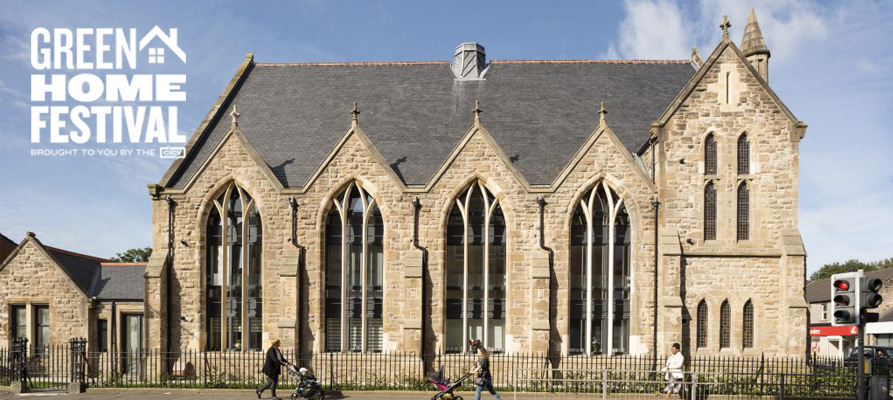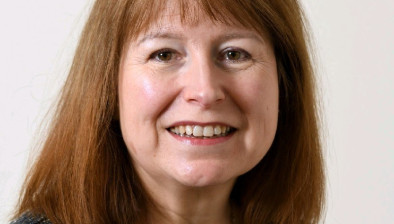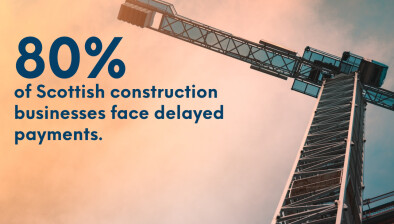Regeneration of religious buildings to be highlighted at Green Home Festival

The organisers of the upcoming Green Home Festival are urging religious and community groups to attend their upcoming show and discover how Scotland’s abandoned churches can be transformed into energy efficient social housing that benefits whole communities.
In Bringing Churches Back to Life, architects will explain what happens to former churches and community halls at the end of their working lives and how they can be converted into sustainable, eco-friendly homes for those who need them most.
And organisers say the show is the ideal opportunity for religious bodies to see how Scotland’s classic buildings can be saved for future generations – and the potential of transforming them into low-carbon homes that also benefit the environment.
Green Home Festival co-organiser David Logue, who is partner at Gardiner & Theobald, said: “Scotland has a large number of churches and other religious buildings that face a wide range of challenges due to their ageing infrastructure and exposure to the elements.
“Running costs, ongoing maintenance and dwindling usage can all mean that such buildings face an uncertain future, plus their very size often means that it’s difficult to know what to do with such a large space.
“Converting such buildings into energy-efficient social housing is already gaining traction and the upcoming Green Home Festival will give examples of how such ideas have already become reality.
“We hope that religious bodies, community groups and those with an interest in Scotland’s heritage will join us to explore the options for resurrecting buildings that might otherwise be left to decay or stand empty.”
The Green Home Festival show on Friday 18 August will see Eamon McGarrigle and Jess Davidson from Page\Park architects explain the challenges of marrying old with new to achieve ‘passivhaus’ standards.
They’ll reveal details of the first social housing built to such standards in Glasgow and share their experience in developing retrofit plans for the conversion of existing buildings for housing, with a focus on the delivery of low-energy and zero carbon strategies.
This will be followed by a presentation by James Anthony of Eco Congregation Scotland, who’ll outline the many issues found in church buildings while seeking to reduce carbon and give an overview of the body’s own ‘greening’ strategy for such structures.
Co-organiser Gordon Nelson, Scotland director of the Federation of Master Builders, added: “Scotland has some truly beautiful religious buildings that are coming to the end of their working lives and yet absolutely deserve to be preserved, used and admired for generations to come.
“If we can combine such preservation with energy efficient-housing that benefits local communities, that has surely got to be a good thing for both the environment and the people who live in them?
“This Green Home Festival show will demonstrate some excellent initiatives and we would encourage anyone with an interest in church buildings to attend and find out the potential for bringing them back to life and giving them a useful and rewarding purpose.”
Starting on Monday 14 August, and organised by the Construction Industry Collective Voice (CICV), the second Green Home Festival will deliver 11 free shows on low-carbon living as part of the official Edinburgh Festival Fringe.
Topics will include how to reduce energy bills, preparing for heat pumps, community heating networks, creating sustainable kitchens, green garden rooms and offices, making retrofit projects eco-friendly and how the home of the future will be powered.
Live sessions will take place at the Royal Institution of Chartered Surveyors (RICS) at 10 Charlotte Square in central Edinburgh, with contributions from the likes of Home Energy Scotland, Scottish Water, SNIPEF and SELECT.
The festival is the latest in a string of practical and constructive initiatives launched by the CICV since its creation at the start of the pandemic in March 2020.
Made up of 28 trade associations, professional services bodies and companies, it has maintained a steady supply of information and practical advice to the sector as well as carrying out surveys, producing animations and posters, hosting webinars and maintaining close dialogue with Scottish Government ministers.
















